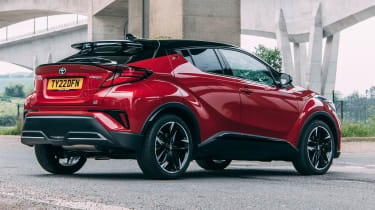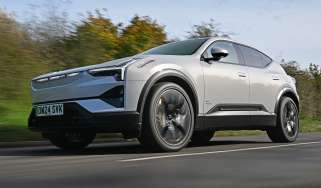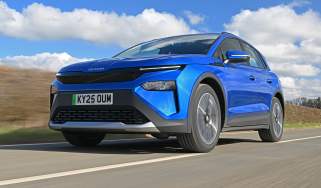Toyota C-HR review
The Toyota C-HR hybrid is an accomplished small SUV that boasts low running costs and bold styling
Pros
- Bold design
- Quiet when cruising
- Excellent fuel economy
Cons
- Poor infotainment
- Noisy acceleration
- Not overly spacious
| Model | Fuel economy | CO2 emissions | 0-62mph |
|---|---|---|---|
| 1.8-litre | 53-58mpg | 110-112g/km | 11.0s |
| 2.0-litre | 50-53mpg | 119-120g/km | 8.2s |
In the crowded compact SUV class, the Toyota C-HR stands out with its unique styling, taking on less head-turning rivals like the Hyundai Kona Hybrid, Honda HR-V and Kia Niro Hybrid. Before its 2020 facelift, four out of five C-HRs were bought with a hybrid engine, and it’s here that Toyota made the biggest change: the car is these days hybrid-only, with a line-up of 1.8 and 2.0-litre petrol-electric options to choose from.
The 1.8-litre engine – also found in the Toyota Prius – sees the petrol element working in tandem with an electric motor to provide 120bhp and fuel economy just shy of 60mpg. The 2.0-litre engine was first seen in the Toyota Corolla and features two electric motors: a main one to provide drive and a supplementary one that harvests energy from the car’s regenerative braking system. Total power amounts to 182bhp, which lowers the C-HR’s 0-62mph time from 11 to 8.2 seconds.
That extra turn of speed comes at the cost of some fuel efficiency: Toyota says the 2.0-litre model should return a still-respectable 50-53mpg, and our test drive on UK roads suggested this is a realistic figure to aim for. All versions of the C-HR feature a CVT automatic gearbox, with drive sent to the front wheels only.
Bear in mind that the C-HR is a "self-charging" hybrid like the Toyota RAV4 and not a plug-in like the MINI Countryman or Renault Captur. So, while you can’t charge the car with a cable, you’ll spend a surprising amount of time in ‘EV mode’. The 2.0-litre version is more effective in this respect thanks to its more powerful electric motor, which will kick in for short (but frequent) bursts at speeds of up to 75mph.
As SUVs go, the C-HR drives tidily, with light steering and reasonable cornering ability making it a doddle to steer around town. Toyota says various tweaks have been made to the suspension to make the slightly heavier 2.0-litre version more comfortable, although the car still feels unsettled on most roads. A GR Sport version, with tweaked suspension for sharper handling, joined the line-up in early 2021.
Overall, the C-HR is a highly appealing small SUV, with a five-year/100,000-mile guarantee and a generous equipment list likely to tempt many buyers away from its main rivals. For a more detailed look at the Toyota C-HR Hybrid, read the rest of our in-depth review...



